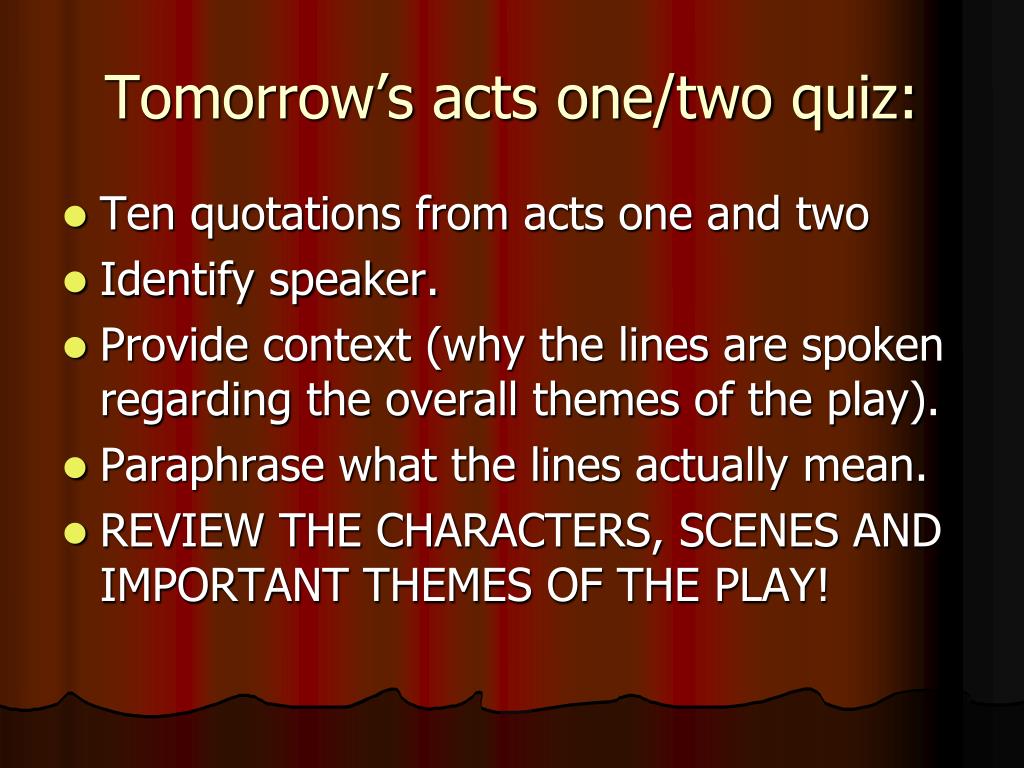

Christopher Morrison's fight choreography gives the final act a nice kick in the pants. Steve Whitaker's lighting design is gloomy and minimalist. The designers who are present are accounted for admirably. But where, oh where, is the sound designer? We think that a little textural sound and, God forbid, music or wind rustling, would have done wonders towards letting Tobin slow down a bit. In general, the designers have supplied just enough detail to clothe this naked rush towards catastrophe, especially Bo Crowell on set, who has held back to the point of only allowing himself crates and barrels.

The actors and the play move quickly (some to the point of rushing their lines) and they step on and step down like a spinning lazy Susan. His frustration at exile comes off as being stunned into grief. Redon Ramsey as Banquo is understated in life and devastating in death, and Michael Hovance (is that Adrien Brody I see before me?) makes Malcolm a much more interesting part than we'd ever considered it to be. She channels some kind of Beverly Hills madwoman-housewife, trying to make the guests stay at the table while her husband goes mad and draws a dagger at an empty chair. Hassett, unfortunately (and this is Shakespeare's fault) doesn't get enough time on stage, but she shines in the great scene where Banquo's ghost comes and sits at the dinner table with Macbeth and fellow lords. Tobin makes Macbeth seem like a really nice guy who just cracks under the pressure of the murders, and his greater madness, when it does come, is a shocking contrast to the sweet-faced first act. He likes his monologues fierce and anxiously quick (this entire play somehow sneaks in at under 2:15 with a ten-minute intermission), and remains entirely dependent on his Queen, a vivacious, becorseted Julie Ann Hassett. Robert Tobin's Macbeth is young, hot, and bothered. They change their costumes there, at the edge of the stage, and we see them watching, either as courtiers, witches, or corpses. On a dirty, jagged postage-stamp of a stage, no more than twelve feet square, a strong ensemble cast steps forward, says their lines of unspeakable terror and beauty, and then steps down to the side. He has ostensibly moved the Scot's timeline forward, but modernized, in this case, doesn't mean mutilated, and the rich, bloody language is the Dog Star of this production.Īlthough we still can't get behind Costello's decision to have the three Weird Sisters cavorting with a giant plastic syringe, we liked this production very much. Josh Costello's sparse production of Macbeth is currently playing through Dec. The variation comes from watching the actors react, as they each realize - yes, it is that bad, and yes, it's going to get much worse. Macbeth is a play of sudden, constant, bloody action. More needs she the divine than the physician.Īnd more needs we Shakespeare than either one. To their deaf pillows will discharge their secrets: The allusion to Pontius Pilate may lie in the background of this scene as well.Foul whisperings are abroad: unnatural deedsĭo breed unnatural troubles: infected minds Of this most grievous guilty murder done! How fain, like Pilate, would I wash my hands Guilt can stain a whole life, but life itself is fleeting.Ĭompare also the Second Murderer’s nervous guilt in an earlier Shakespearean tragedy, Richard III: Bradley has said she is “denied the dignity of verse”–uniquely among major Shakespearean characters making their final appearance.Ĭompare “Out, damned spot! out” with Macbeth’s later “Out, out, brief candle!” in Act 5, Scene 5. It may be a reflection of her mental and emotional state that she is not speaking in verse this is one of the few moments in the play when a major character-save for the witches, who speak in four-foot couplets-strays from iambic pentameter. She is completely undone by guilt and descends into madness. Her recall falters: her memory obsessively returns to the murder, but she doesn’t seem to know whether it’s happened yet or not. Now, however, she too hallucinates blood.

When Macbeth believed his hand was irreversibly bloodstained earlier in the play, Lady Macbeth had told him: This passage from the first scene in the fifth act of Macbeth is one of the most indelible expressions of guilt in all of literature.Įarlier in the play, Lady Macbeth possessed a stronger resolve and sense of purpose than her husband and was the driving force behind their plot to kill Duncan.


 0 kommentar(er)
0 kommentar(er)
